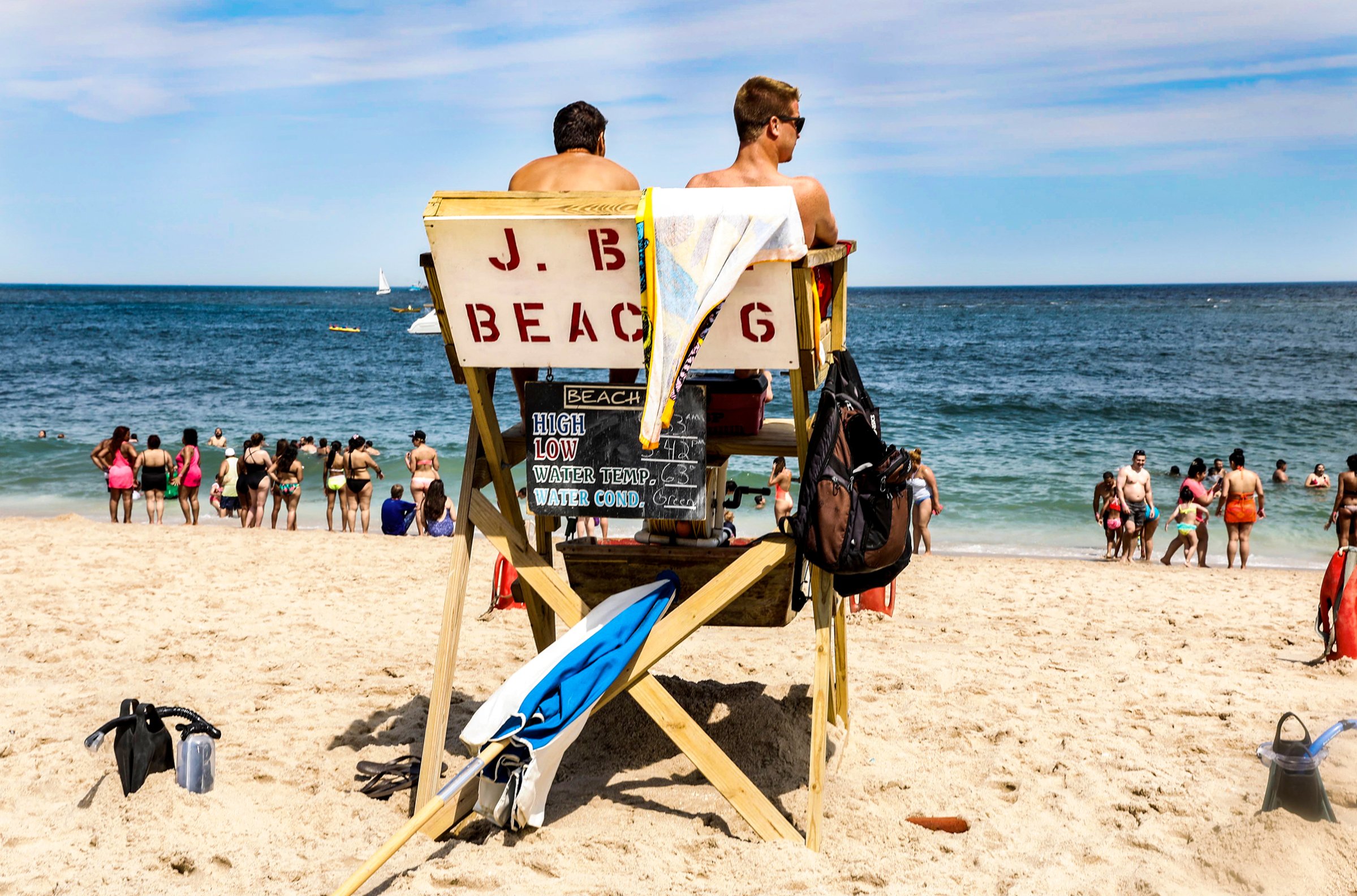
It’s not like the jobs aren’t there. The ice cream still needs scooping. A Tilt-a-Whirl doesn’t run itself. And that floppy, weirdly heavy rubber frog that somersaults toward the rotating lily pads? Hit or miss, someone’s got to bring it back to the catapult for the next lucky player. The work of an American summer remains, sticky and sweet as cotton candy, which doesn’t sell itself either.
But when Jenkinson’s Boardwalk went looking for seasonal employees last year, the response was not at all what the company expected. To fill some 1,200 summer vacancies, an Easter-time job fair drew just 400 people. Applications did bounce up this year, but not nearly enough to reverse a grave trend that summer employers have noticed well beyond the Jersey Shore.
“It is getting harder to find students that will work,” says Toby Wolf, director of marketing at the boardwalk. “Each year it’s getting harder and harder. None of us has been able to pinpoint why. Is it a change in society as a whole?”
This is a question to chew over on the long road trip from Glacier National Park–where concessions could be staffed by Bulgarians on work-study visas–to Maine, which each summer struggles to fill the lifeguard chairs above its beaches. The same story holds at the water attractions at Wisconsin Dells and on Cedar Point’s roller coasters in Sandusky, Ohio. As a nation, we have lately endured the demise of comity and the fracture of factual truth. Are we now witnessing the slow death of the summer job?
Read More: What These Celebrities and CEOs Learned From Their Summer Jobs
The numbers are not encouraging. Forty years ago, nearly 60% of U.S. teenagers were working or looking for work during the peak summer months. Last year, just 35% were. Note the element of declaration: what the U.S. Bureau of Labor Statistics (BLS) tabulates are reports of actually desiring work during the months when most high schools and colleges are off. It is a statement of intent. Plotted on a chart, the decline is unmistakable and, since the turn of the new century, precipitous–plummeting 15 points in 15 years, to where we are now: only about every third youth working or looking for work this summer.
All this as the nation’s job outlook is what economists describe as “full employment” and as employers display a hale appetite for summer help. In a national online survey for CareerBuilder.com conducted in February and March, 41% of companies said they planned to hire seasonal workers–up sharply from 29% in 2016. The annual survey captures more than numerical truth. Asked who they planned to bring on for the summer, the responses revealed an intimacy not usually captured in top-line statistics: 34% said they planned to hire a friend, 30% a family member and 19% said they were putting their kid on the payroll.

It’s a measurable economic activity that may not even be that much about money. On June 26, former Vice President Joe Biden climbed back into the lifeguard chair where he spent the summer of 1962, as a suburban kid watching over an inner-city pool in Wilmington, Del. “I learned so, so much,” he said at the ceremony where the pool was renamed for him. Summer jobs are like that, a rite of passage looked back upon over the course of the life those eight or 12 weeks might frame–or stand memorably apart from.
“I worked in a movie theater when I was 16,” says Judy Schram, now 64, as her 7-year-old grandson Max dangles a fishing pole with a magnet instead of a hook over a gurgling stream of plastic fish on the Point Pleasant boardwalk. “I sold Christmas cards door-to-door. Oh, and I had a paper route–took it over from my big brother when I was 10. My parents wanted us to work. And we had chores. Nowadays it’s completely different. Kids don’t work now.”
The payroll offers at least partial confirmation: more and more, jobs historically done by vacationing students are being taken by older Americans forced to extend their working lives, or foreigners looking for their chance. At the same time, for many young Americans in the second decade of the 21st century, the choice is not between a summer job and a summer idyll. (Of course for many teenagers whose families need the money, not working during the summer is not an option.) The preoccupations of the heavily scheduled school year–college preparation, organized sports, volunteer work–are also determining what one does on summer vacation.
But not for all. It’s 15-year-old Madison Andrews who lands the plastic fish for Max, flips it over and explains he can have two small prizes or one medium. On the cusp of her sophomore year in high school, she is delighted with her first job. As a minor she’s paid only $6.50 an hour, but points out that she can go on the beach for free before her shift (in many parts of New Jersey, you have to pay).
“I love kids, and I also need money,” Andrews says. “I want to save up for a car.”
What’s changing in America? Not observations on kids these days. Polls confirm what the heart already knows: every generation thinks the one coming up behind it is at least a little bit spoiled. The sentiment is expressed first as aspiration–the desire to see your kids live better than you were able to–and then, if prosperity indeed arrives, as complaint. “Kids don’t work anymore,” says the manager of a company that struggles to recruit teen counselors for sleepaway camps, speaking privately to vent. “Mine are 12 and 14, and they want everything to be done for them.”
But what has most assuredly changed is how much more some of us are prospering compared with others. The rich are indeed getting richer–average income for the top 5% of households has reached $350,000 a year, with the upper middle class, defined as the top 20%, averaging $200,000. Everyone else in America more or less treads water.
On the Jersey Shore, the differences are visible not only at the boardwalks, but in the neighborhoods that butt up against them. The rows of one-story working-class rentals that novelist Richard Ford described as “little desperate houses” are being replaced, after the floods of Superstorm Sandy, by multistory palaces measuring 6,000 sq. ft. These lavish second homes are intended not just for changing clothes or naps between trips to the beach, but for an altogether more expansive vision of the good life, with floor-to-ceiling glass and Calphalon cookware hanging over the range.
This sorting of the U.S. population at least begins to account for the change in how teens are spending their summers. The BLS reports that, in a societal shift as slow (and as relentless) as the movement of tectonic plates, less affluent older workers are indeed delaying retirement and taking part-time jobs in fields, like food preparation, where teens are now working less. But the same market forces that require some to keep thinking about work later in life compels their grandchildren to begin thinking about it earlier and earlier.
The calculus begins with a question: What makes the biggest difference in a lifetime’s income? The answer has been shown to be higher education. A bachelor’s degree or higher pays a premium of more than 85%. Kids have been told this forever, and for the last couple of generations–the members of X and Y–preparation for success began in kindergarten. And those plans do not encourage passing July afternoons painting houses.

“It’s too competitive. There’s too much pressure,” says Dan Schawbel, author of a book titled Promote Yourself. “Getting into college is much harder than it was for boomers. Getting a job is really hard. So you’ve got to get started as early as possible.” Schawbel offers his own career track as an example. He got his own internship in high school (making cold calls), and followed that up the next summer with one designing brochures for a travel agency. Today he translates the workplace’s generation gaps through a company called Millennial Branding, which produces surveys like the one showing 77% of high school students are interested in volunteering to gain work experience. That is, working to put a line on a résumé, or college application, but no actual pay.
At the Jersey Shore, Wolf has noticed the trend on the boardwalk, when she tells the unpaid interns–kids with an eye toward a career in marketing–that their schedule can be fit around their other obligations. “They say, ‘No, I want to make these a priority,'” Wolf says.
The competitive college process, which has put a premium on students’ extracurricular and volunteering work, incentivizes this behavior. The National Honor Society, for example, has quotas for volunteer work.
Then there’s school. American kids are packing much more into their K-12 years than baby boomers ever did. Summer school, once seen as a punishment for laggards, now functions as an academic accelerator; 40% of 16-to-19-year-olds were enrolled in school last July, according to the BLS. It’s work that may not produce wages, but certainly counts as an investment–and, from the perspective of long-term returns, quite possibly the most efficient use of their time. As the BLS says: “Teen earnings are low and pay little toward the costs of college.”
All of which sketches a portrait of the modern student as a diligent careerist. Is it coincidental that, over the past decade or two, high school students left the summer-job market in exactly the same numbers as they swelled the ranks of colleges? Depends who you ask. On the Jersey Shore boardwalk, the U.S. students who are working for an hourly wage acknowledge the new exigencies with a nod. Then they offer a personal observation about teens who don’t work. These are their friends, after all.
“I think it’s the way you’ve been raised. They’re given things instead of working for them,” says Alana Masino, 20, working her sixth summer at Kohr’s Frozen Custard. She is studying education at nearby Georgian Court University. “I mean, I’ve taken summer classes and worked at the same time. So I think it’s a luxury.”
Out in the parking lot, wreathed in the citrusy odor of the sunscreen four young men are slathering on their torsos before heading across Ocean Avenue, some of those who’ve opted out explain why.
“I have my PCAT,” says Jim Fattal, 19, on why he hasn’t taken a paying job to fill the time between his first year and second year at Albany College of Pharmacy and Health Sciences. The Pharmacy College Admission Test is what the LSAT is to law schools and the MCAT is to medical schools, and taking time off to study for it makes sense, Fattal says.
“For me,” says Maxx Oberti, also 19, “it’s because I’m actually going to be a flight instructor in Daytona Beach. Also, I’m always doing sports and stuff, so I never had time.” The expansion of youth sports into an all-consuming, year-round activity has thinned the ranks of prospective summer workers too. “I have sports during the summer,” says Jeffrey Bennett, 16, who points out he works at the Boys & Girls Club during the school year.
Of the four friends down for the day from Wayne Township, only Benjamin Coghlan, 19, took a summer job, working in sales at Bed Bath and Beyond; last year it was Babies “R” Us. “I’m doing it because I want to be a mechanical engineer,” Coghlan says. “They want experience everywhere, to show you can talk to people.”
None of the beach gang come from notably wealthy homes. Their parents are a cop and a nurse, a civil engineer and a homemaker, a pager technician. “I mean, my parents will pay for some stuff,” says Coghlan, “but they won’t let me just blow money.” With a glance toward the midway, he adds: “I would love a job like working at a boardwalk. But where we live, it’s working in a mall.”
It’s really not the same, is it? The galleria has contributed meaningful moments to the myth of American adolescence, but in warm weather, it’s the outdoors that beckon. The summer job, like the season and its velvety nights, is temporary if not fleeting. By tradition it is more about summer than about job, and more about living than about building a résumé, which may be why even miserable jobs can prove, in retrospect, of gemlike value. In a country with fewer and fewer social levelers–the draft ended in 1973–a college kid might learn more from a dozen weeks on a road crew than haunting any corporate suite, paid or not.
And if, in fact, the summer job is in decline, its essential value to the country is not. The proof of this is the sheer number of foreigners arriving to do it.
“I love this place. It feels like a movie,” says Karla Medina, taking a break from her job shucking oysters and shaping crab cakes above the Point Pleasant Beach boardwalk. She arrived in May from the Dominican Republic, where she is studying industrial engineering. Her bill of passage was a J-1 visa, one of about 300,000 work-study permissions the State Department issues in a year, after the usual vetting, to allow in foreign students for exchange programs–and also to fill the jobs American college kids don’t do. The Jenkinson’s Boardwalk has 113 guest workers this year, nearly twice as many as last year, working everywhere from arcades to garbage duty.
“The elimination of the J-1 program would devastate the overall tourist economy of the United States. It would have an absolutely brutal effect,” says Tom Diehl, president of the Tommy Bartlett Show, the marquee attraction of Wisconsin Dells, which relies on foreign workers for about half of its 10,000 employees.
Almost every tourist destination goes abroad to recruit each winter. Concessions from Yellowstone to Great America send agents through Bulgaria, Taiwan, the Philippines, Ecuador. U.S. ski resorts hire students from southern-hemisphere nations like Australia and Argentina, where summer breaks line up with the Christmas rush. About 15 years ago, Tommy Bartlett set up its own pipeline direct from Finland. “If anyone says these people are taking jobs away from Americans, they don’t know what they’re talking about,” Diehl says.
It’s a bargain all around. “The cost of studying abroad in somewhere like the U.S. is prohibitive,” says Phil Simon, a vice president at CIEE, a Portland, Maine, firm that lines up employers with foreign students. “But if you have the opportunity to hone your skills, work on your English and make a friend network, it’s very attractive.”
The downsides for the workers are fees to an agency and the cost of airfare. The upside? Earning at least minimum wage, which is better than back home, discounted housing and board, and the opportunity to experience the nation that looms large in TV and film almost everywhere in the world. The most enduring U.S. export after all remains popular culture. Last year, a boardwalk guest worker who grew up idolizing LeBron James drove from Point Pleasant Beach to Cleveland, scored an NBA Finals nosebleed seat and made it back in time for his shift.
In a nation of immigrants, they are hard to pick out by sight. But Chris Stewart, who handles HR for Jenkinson’s, points them out on a Thursday in June: a pair of newly arrived Romanian workers, still dazzled by the New York City skyline; three wide-eyed Taiwanese, just picked up from the airport. Stewart himself grew up in New Jersey, and thought he wanted to make it big on Wall Street. But after spending time there he realized there was more to life. As if to underscore the perspective one can glean over a summer, he heads over to a stand and comes back with Petar Zuzic, a handsome 25-year-old from Croatia, back for his second summer serving food to sunburned Americans. “Half the things people asked for, I’d never heard of,” he recalls of his first season. “‘Cheese steak,’ what’s that?”
He’s got his feet under him now, but still has a fresh eye for the telling cultural difference. He used to work summers in the local tourist industry of his hometown, on the Adriatic Sea, but the pace wasn’t nearly as fast. School was different too. He’s studying law, which in Croatia you can do for free if your keep up your grades. “Here it’s quite a difference experience, of course. It’s entirely out of my field,” Zuzic says of his seasonal employment in America. “You get other points of view. It’s valuable.”
And after all, who ever took a summer job just for the money?
–With reporting by MERRILL FABRY/NEW YORK
More Must-Reads From TIME
- The 100 Most Influential People of 2024
- Coco Gauff Is Playing for Herself Now
- Scenes From Pro-Palestinian Encampments Across U.S. Universities
- 6 Compliments That Land Every Time
- If You're Dating Right Now , You're Brave: Column
- The AI That Could Heal a Divided Internet
- Fallout Is a Brilliant Model for the Future of Video Game Adaptations
- Want Weekly Recs on What to Watch, Read, and More? Sign Up for Worth Your Time
Contact us at letters@time.com